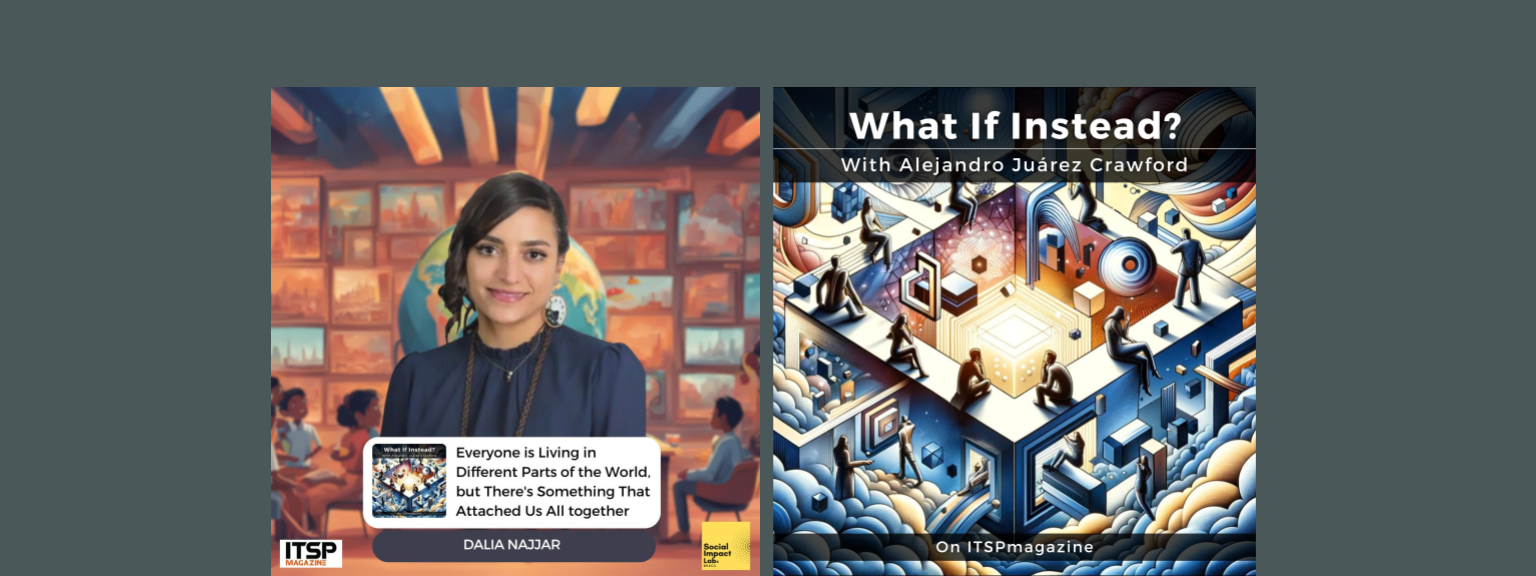Everyone is Living in Different Parts of the World, but There’s Something That Attached Us All together
In the sixth episode of the “What if Instead?” podcast, cohosts Alejandro Juárez Crawford and Mim Plavin-Masterman are joined by Dalia Najjar, the youngest general manager in the history of Farouk Systems and a social entrepreneurship instructor. Najjar has not only led cohorts from Palestine and from Belarus studying in Lithuania. She also describes projects her students initiated with collaborators in Bangladesh, Kyrgyzstan, and other countries. In a striking model, she describes each team working on hyperlocal problems. Each team engages deeply with facts on the ground, as opposed to imposing some solution cooked up far away – but then informs this with input from collaborators in other parts of the world. Najjar highlights the unique approach of deriving solutions locally, with mutual help from others working on problems in other parts of the world. Co-host Mim Plavin-Masterman calls this a “hyperlocal solution – with global input.This, Najjar stresses, applies not only to students, but also to instructors from each region, collaborating to facilitate the process:
It’s true that I was teaching the students, but also I was learning through those students… through the network I was working with… through the international co-instructors I was working with. Each student’s unique perspective and approach to problem-solving enrich the learning environment, leading to innovative solutions that reflect their individual insights.
As they do this, Najjar points out how reasonable it is to feel overcome when we face the worst human beings suffer, we gain strength when we work together to find solutions:
Tell me, ‘I don’t like this and I would prefer this to be like that.’ Then I would listen. If you just tell me, ‘I don’t like this,’ no, that’s not okay. Tell me what would you like instead of this and how can we work together to make that better?
For Najjar, the concept of teaching extends beyond traditional instruction. She views it as an empowering process where everyone, including students and faculty, supports each other to unleash their full potential:
I don’t like to use the word teaching… I think we’re just empowering each other… when we believe that we can actually do it together. We just empowered her to unleash that potential that she did not know existed within her personal personality. So it’s just, I think we do it unintentionally and we do it all together to each one of us. So the students as well empower me. When I read this email, I am empowered and I am fueled to continue to do what I’m doing.
As an example, she shares the story of Melodies for Palestine, a project that aims to use music as therapy for Palestinians who lack access to it. This initiative highlights how local problems can be addressed through innovative and culturally relevant solutions:
Melodies for Palestine, where she ensured that music could be accessed by as many Palestinians as possible, specifically during the war now. She started brainstorming what problem she wanted to work on or what she wanted to think to change in Palestine or in this world or something that she would want to have, like to have better access to. She chose Melodies for Palestine as her project. Najjar underscores the importance of collective effort in driving change. She believes that while individuals can make a difference, meaningful change happens when people come together globally:
It does not matter where you come from or what struggles you are facing or what you are suffering from. You just need the will to make change. Each of us is from different parts of the world, but we all gather around the same will or around the same result that we want to see.
She stresses that identifying the problem is more crucial than finding the solution. Once the problem is clear, numerous solutions can be explored to meet the needs of those affected:
What matters is to fill the needs of those people you serve. What matters is to identify the problem and make sure that you know the needs of the people that you serve. Because there’s never only one solution, right? We don’t care about what solution you choose as long as you solve the problem. So what matters is the problem itself. There are hundreds and hundreds of solutions that you can implement. What matters is to identify the problem and make sure that you know the needs of the people that you serve.
Her source of motivation lies in seeing her students succeed and make an impact. This mutual empowerment fuels her passion for teaching and drives her to continue working on challenging issues:
The pleasure comes from creating something that they own with a great impact. When we see the students enjoying their work and putting so much effort to change this world, it gives us more and more fuel to keep going. And as hard as it is for us, it’s also hard for the students themselves. Trying to solve something that they are going through or trying to solve something for very close people they have or something they are witnessing going wrong in their communities and they put everything they can to make a change.
The endeavor to act draws on us. But that, strangely enough, gets us through:
And it needs a lot of work. It needs a lot of bravery. You need to be really brave to go through this journey and tackle it and meet with those people who are suffering and look at their needs and make sure that you are actually filling the needs of those people that you are serving.
What if Instead? is produced by Srijan Banik and the team at Social Impact Lab at BRAC University, which Banik founded. Cohosts Mim and Alejandro’s One Size Fits None: Time for an Entrepreneurial Revolution, is forthcoming from Emerald Publishing in Summer 2025


